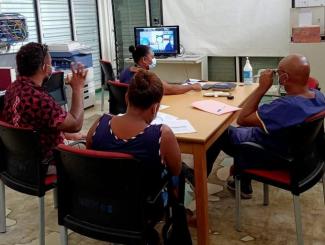(Contenu disponible en anglais uniquement)
Infection, prevention, and control (IPC) focal points from Fiji, Vanuatu, Tonga, Kiribati, and Solomon Islands successfully completed a 10-hour hand hygiene Gold standard auditors training. They are now recognised as the first cohort of IPC focal points in the Pacific as Hand Hygiene Australia (HHA) Gold Standard Compliance Auditors & Assessors, and are now able to train general auditors making the program more sustainable at country level.
The training was held virtually during the first week of April and was facilitated by Kate Ryan, HHA Manager and Program coordinator.
The Pacific Community (SPC) in collaboration with the Peter Doherty Institute with funding support from the European Union (EU) and the Australian Department of Foreign Affairs and Trade (DFAT) worked together to adapt the hand hygiene standard operating procedures and audit tools, with permission from the HHA 5 Moments for hand hygiene manual to make it more appropriate for a Pacific Island context
Healthcare associated Infections (HA) is a major problem for patient safety. Studies have shown hospital-wide prevalence of HAI range from 5.7% to 19.1%, with the greater burden of HAI occurring in low- and middle-income countries. According to the world health organization improving hand hygiene practices may reduce HAI transmission by 50%.
The surveillance methodology and resources developed for this training program are based on the Hand Hygiene Australia (HHA) program which has been successfully implemented both across Australia and New Zealand. This program trains ‘Gold Standard Auditors’ (GSA) who are then able to train general auditors, making the program more sustainable at a local level.
Betty Ramolelea IPC focal point from Solomon Islands said, “I’m so grateful to attend this very useful training to help us all, the IPC Nurses in the Pacific to get us to another level with the IPC standard of HH”.
Earlier this year in March, a virtual training on surgical site infection (SSI) surveillance to adopt a more standardized approach for definitions and methods for SSI surveillance was facilitated by Donna Cameron, the Infection Control Consultant at the Peter Doherty Institute. This surveillance goes hand in hand with IPC measures as it identifies problems and guide IPC activities.
SPC’s Infection, Prevention and Control Adviser Margaret Leong highlighted the significance of the program for Pacific Island Countries and Territories (PICTs) in strengthening their IPC mechanisms through PICNet, one of the six support services of the Pacific Public Health Surveillance Network (PPHSN).
“IPC focal points are now equipped with training skill and knowledge to strengthen hand hygiene compliance and as a result we expect to see immediate benefits for patients across the region.”
This training is also sustainable given that health workers will be able to train others as general auditors, which is in line with PPHSN’s goal to improve PICTs human capacities on the long haul.
Contact(s): Evlyn Mani , Information and Communications Officer, Public Health Division, Pacific Community (SPC) | evlynm [at] spc.int (evlynm[at]spc[dot]int)

